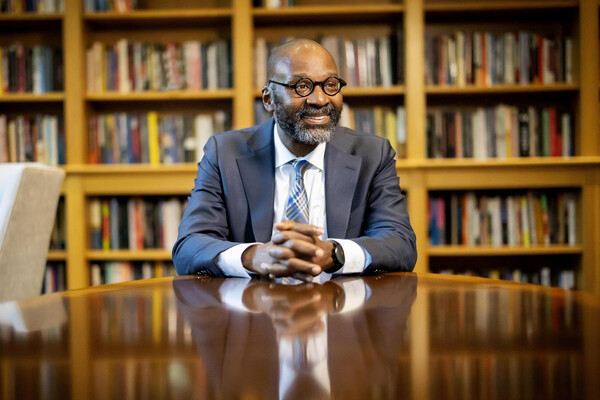
Griffin Pitt, right, works with two other student researchers to test the conductivity, total dissolved solids, salinity, and temperature of water below a sand dam in Kenya.
(Image: Courtesy of Griffin Pitt)
For the second summer in a row, emerging teachers at Penn GSE spent a week learning how to lead tough conversations about history, civics, politics, and policy.
The DISCUSS Project, a collaboration between Penn GSE and Temple University, is a cohort-based program that tracks the development of pre-service and early-career teachers, starting with their first months in the classroom.
It’s not just a thought experiment: the teachers led in-person discussions for a room full of Philadelphia kids. The teachers prepared for the lesson by gathering a series of sources, such as news articles and historical documents. A sample topic might be, “Should you vote for third party candidates?” Leading a discussion means encouraging students to interpret and evaluate history, rather than simply memorize it. It’s less didactic, more interactive.
“We manufactured a sense of urgency, so there was an authenticity to the work that is often missing in summer professional development,” says associate professor Abby Reisman, who has taught in Penn GSE’s Teaching, Learning, and Leadership division since 2014.
A discussion-based pedagogy can work wonders in all subject areas, and much of the research has actually come from math classrooms. It turns out that when a teacher genuinely asks a student to contribute to the lesson, it increases the child’s motivation, engagement, and subject matter learning.
Yet, social studies poses a unique pedagogical challenge when it comes to discussion. Since the subject matter often overlaps with front-page politics, teachers can be hesitant to open up what might be a can of worms rather than a productive discussion. They realize that the subject of history—and how schools and districts teach it—has become a political football in recent years. But Reisman says that isn’t necessarily new: “There has always been huge backlash against instruction that gets kids to think critically about history.”
Read more at Penn GSE News.
From Penn GSE

Griffin Pitt, right, works with two other student researchers to test the conductivity, total dissolved solids, salinity, and temperature of water below a sand dam in Kenya.
(Image: Courtesy of Griffin Pitt)

Image: Andriy Onufriyenko via Getty Images

nocred

Provost John L. Jackson Jr.
nocred